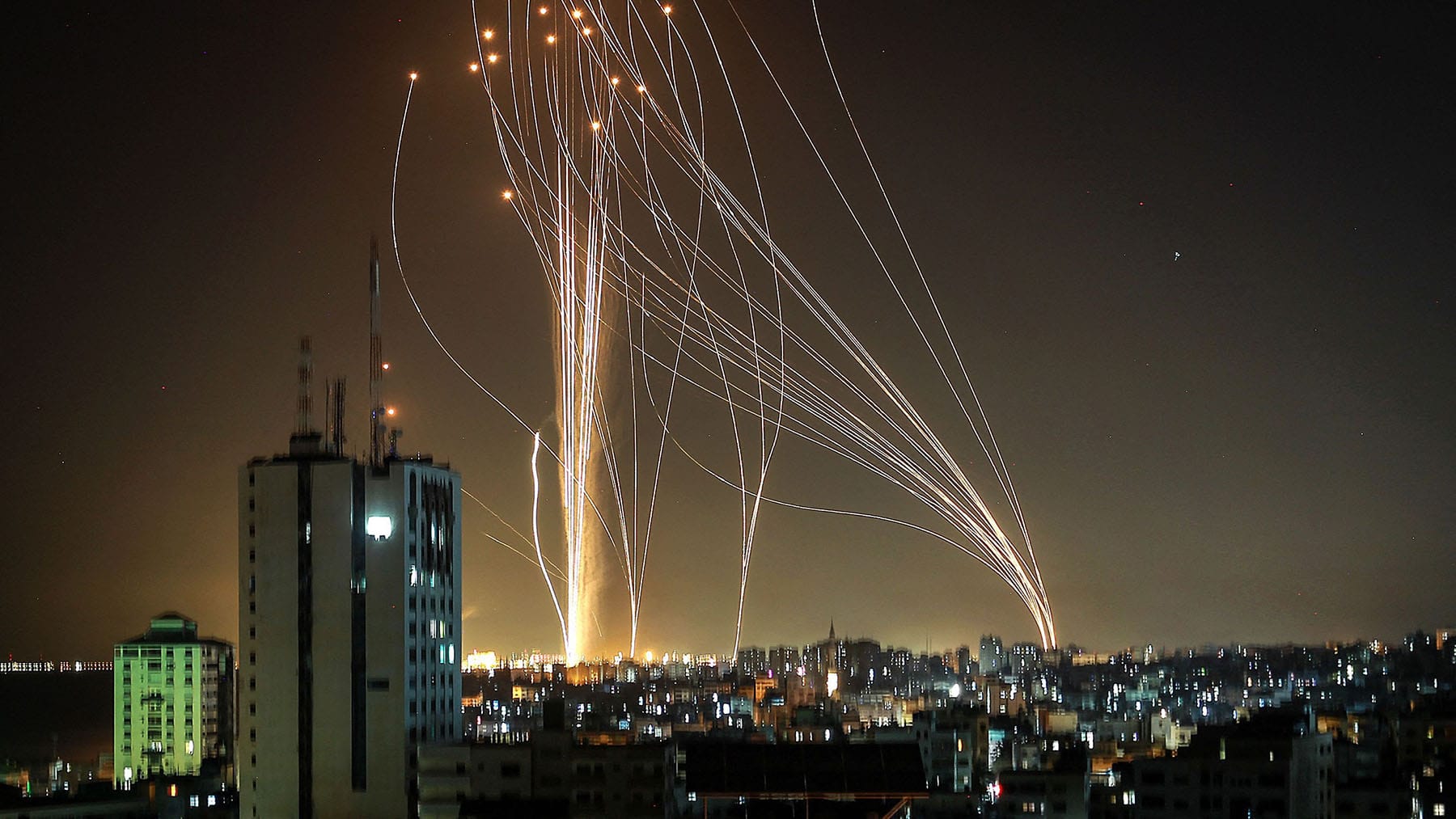 Rockets are launched from Gaza City toward Tel Aviv, Israel on May 11, 2021. (Anas Baba/AFP via Getty Images)
Rockets are launched from Gaza City toward Tel Aviv, Israel on May 11, 2021. (Anas Baba/AFP via Getty Images) (The Media Line) Two civilians were killed and more than 80 wounded by Gazan rockets raining down on Israeli cities and towns on Monday and Tuesday, with no end in sight.
The Israel Defense Forces estimated that Palestinian organizations in Gaza had fired more than 500 projectiles. The vast majority were directed at Israel’s southwest − the area adjacent to the Strip as well as the cities of Ashkelon and Ashdod − but Hamas fired seven long-range rockets toward Jerusalem on Monday evening and warning sirens were sounded in Israel’s capital and the nearby city of Beit Shemesh.
Thousands of mostly young Orthodox Israelis were in the capital’s streets, marking Jerusalem Day in celebration of its reunification under Israeli rule in 1967.
Islamic Jihad, the second-largest armed organization in Gaza, fired an anti-tank missile at an Israeli civilian vehicle parked just outside the Strip on Monday. A video later released by the organization shows that its operatives saw that the driver was not wearing a uniform before they targeted the car. The driver, who had exited the vehicle and was a few yards away, was lightly wounded.
Israel responded to the rocket fire with a long series of airstrikes against “targets belonging to the Hamas terror organization in Gaza.” The IDF spokesperson said that more than 130 attacks have been carried out, targeting ammunition storage and manufacturing sites, Hamas attack tunnels intended for infiltration into Israel, and Hamas and Islamic Jihad operatives. Palestinian sources reported 26 casualties, including nine children.
Attacks against Hamas and Islamic Jihad targets in the Strip will continue, the IDF spokesperson said.
On Tuesday, Defense Minister Benny Gantz approved the call-up of 5,000 army reservists.
Prof. Gabriel Ben-Dor, head of the National Security Studies Program at the University of Haifa, said Israel would likely continue its aerial response but avoid a ground attack. “I think that the likelihood of a ground operation is very low,” he told The Media Line.
Israel has to decide whether its goal is to exact a price from Hamas for its aggression using aerial strikes that will hurt its military infrastructure and target its operatives, or that its interests would best be served by putting an end to the organization’s control of the Gaza Strip, he explained.
Both Hamas and the Israeli government of recent years were satisfied with the status quo, Ben-Dor explained, “and within that, there are rules to the game – you hit them, they hit you…, but yesterday they violated the rules of the game by firing at Jerusalem on Jerusalem Day. … Now the question is, what can Israel do in response to a blow that is a game-changer, without toppling the regime there?”
The professor believes that despite the attack on Israel’s capital on a day of national celebration, Israel’s government “doesn’t want the chaos” that toppling Hamas would create. Because of this, he predicts that “once again, they will hit them strongly from the air, targeting missile depots, ammo factories, weapons’ development sites, [the organizations’] headquarters, training facilities and so on.”
Brig. Gen. (res.) Dr. Meir Elran, head of the Homeland Security Program at the Institute for National Security Studies at Tel Aviv University, agrees it is highly unlikely that infantry and armored battalions will take part in the operation.
“Israel doesn’t want to be pushed into a military operation that on the one hand won’t solve its problems, and will only create others. … Israel wants to contain the situation by attacking from afar, mainly using airstrikes. Israel doesn’t want to enter Gaza,” Elran told The Media Line.
Both men agree that at present, Israel has no desire to rule Gaza or topple Hamas, and so, entering the Strip is an unappetizing option for the country’s decision-makers.
It should be noted that Israeli ground forces on the Gaza border are being reinforced. However, this has occurred in the past without developing into an incursion.
The escalation between Israel and Gaza comes as Ramadan nears its close, a month of increased tensions and violent clashes between Israeli police and Arabs in Jerusalem, and between Arabs and Jews across the country. The confrontations in the city reached a peak on Monday, when rioters and police forces met on the Temple Mount/Al-Aqsa Mosque compound. Some 300 Arabs were injured, according to Palestinian sources, as were 21 police officers.
Hamas issued an ultimatum to Israel, demanding that its security personnel retreat from Al-Aqsa compound and the Sheikh Jarrah neighborhood (where several Palestinian families face eviction from homes that an Israeli court ruled belonged to Jews before the 1948 war) and all those arrested in the riots be freed by 6 pm, or else they would retaliate. Hamas punctually fired the seven long-range rockets toward Jerusalem, whose streets were then full of Jerusalem Day celebrants.
In tandem with the rocket barrage, violence erupted in several places across the country on Monday night, when Arab Israeli rioters took to the streets. In Lod and Ramle, two cities with mixed Jewish and Arab populations, synagogues and a Jewish school were targets of arson attacks and desecration, compelling residents to save sacred Torah scrolls from burning. In Israel’s South, a woman was reportedly dragged from her car, which was then lit on fire. An ultra-Orthodox man was surrounded in his car in the Galilee village of Kafr Kanna; the vehicle was vandalized and he was severely beaten.
An Arab Israeli was killed during the events in Lod. The police arrested a Jewish man on charges of murder for shooting Mousa Hasouna, 25. The suspect claims he acted in self-defense.
This latest round of violence comes as coalition talks were close to bringing the Islamist United Arab List party to support a new government. If realized, the move would be a historic development toward the integration of Arab citizens into Israeli society and politics.
Elran explains that the protests of recent weeks, which culminated in Monday’s riots, were in response to an insult and threat felt by Israel’s Arab population against their religious sentiments, and in particular, their devotion to Al-Aqsa Mosque. A video circling since Saturday night shows Israeli border police entering a mosque and throwing stun grenades. While the context is unclear, these actions being seen as a gross insult to Muslim sensitivities is easily understandable. The fact that this occurred during Ramadan only added to the impact.
In the last two decades, says Elran, the Arab Israeli community has been integrating into Israeli society. This current bout of friction and violence would be extremely significant, he explained, if it turns the tide on this phenomenon. “As a first step, peace must be restored,” he says.





















 More news and opinions than at a Shabbat dinner, right in your inbox.
More news and opinions than at a Shabbat dinner, right in your inbox.